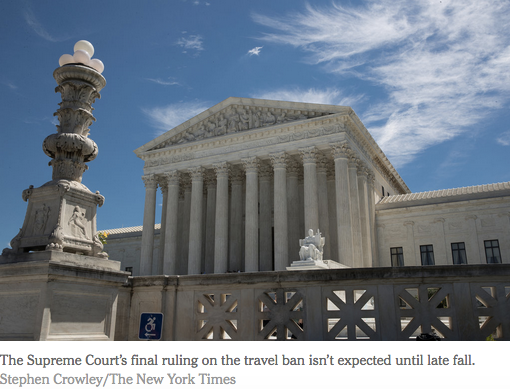WASHINGTON — The Supreme Court upheld some portions of President Trump’s revised travel ban on Monday, setting the stage for arguments on the case in October.
Here are some major questions the case presents:
What did the court decide about President Trump’s travel ban?
The court did two things: It agreed to evaluate the ban next term, and, in the meantime, the court overturned the decisions of lower courts, saying that Mr. Trump’s administration could enforce its immigration ban against certain people while it waited for the Supreme Court to hear arguments and decide the case.
Does that mean that the president can block everyone from coming from the six countries he identified as dangerous — Iran, Libya, Somalia, Sudan, Syria and Yemen?
No. The justices agreed with the appeals courts that certain people should be allowed to come to the United States, as long as they have what the court called “a credible claim of a bona fide relationship with a person or entity in the United States.”
The Travel Ban at the Supreme Court
All the legal jockeying shouldn’t obscure the fundamental foolishness of the policy itself. Despite Mr. Trump’s groundless claim that the ban is necessary to protect national security, no one from the affected countries has been responsible for a fatal terror attack in the United States in the past two decades. This includes the past five months, during which the White House has repeatedly insisted on the ban’s importance even as it has shown little urgency in filing its appeals.
Now the administration has the summer to conduct its vetting review, which was the original rationale for the travel ban — the government needed time to “figure out what is going on,” as Mr. Trump once put it. By October, the ban will have expired and the review should be complete. And by then Mr. Trump might conceivably have developed a factual basis for a policy that continues to bar people from certain countries, which would trigger a whole new round of litigation.




